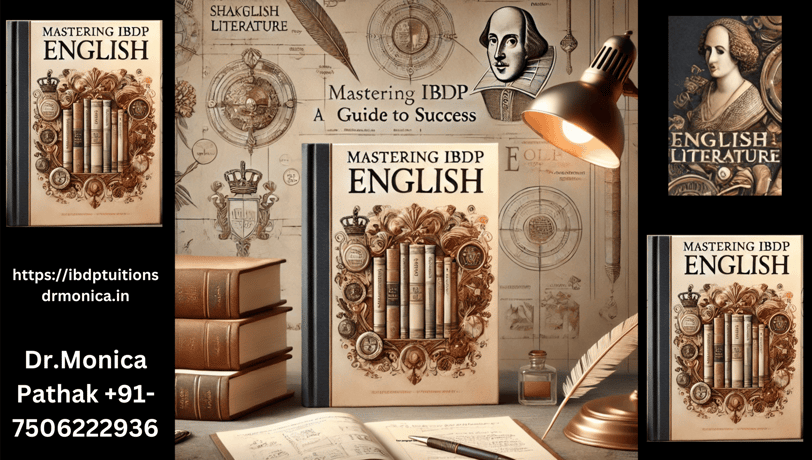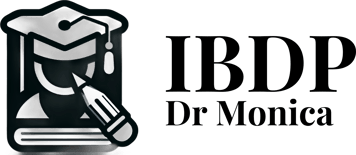Mastering IBDP English: Your Essential Guide to Success
Are you striving to excel in IBDP English? Our comprehensive guide breaks down essential tips and strategies for mastering both the Language & Literature and Literature courses. From understanding complex texts to crafting high-scoring essays, this guide provides the insights you need to succeed in your IB journey. Whether you're preparing for exams or working on your Internal Assessments, we’ve got you covered with practical advice, expert resources, and effective study techniques. Achieve top grades and build confidence with our essential guide to IBDP English!
EDUCATION
Dr. Monica Pathak
9/17/202410 min read


Mastering IBDP English: Your Essential Guide to Success


1. Navigating the IBDP English Curriculum
1.1 Overview of Language A Courses
In the International Baccalaureate Diploma Programme (IBDP), students have the option to pursue two key Language A subjects: Language and Literature, and Literature. Both courses aim to develop skills in critical analysis, cultural appreciation, and language mastery. Students can choose to study either course at Higher Level (HL) or Standard Level (SL), depending on their strengths and interests.
1.2 Distinguishing Between Language and Literature and Pure Literature
The Language and Literature course combines the study of literary works with non-literary texts like articles, speeches, and other forms of media. This course is ideal for students who enjoy exploring language in multiple contexts. In contrast, the Literature course focuses purely on literary texts, offering a deeper analysis of themes, literary devices, and genres across various time periods.
1.3 Key Elements of IBDP English Assessment
IBDP English assessments are divided into internal and external evaluations. These may include oral presentations, written tasks, and formal examinations. The primary components of assessment typically include:
Individual Oral Commentary (IOC)
Written assignments
Paper 1 (Textual Analysis)
Paper 2 (Comparative Essay)
2. Building Strong Critical Reading Skills
2.1 Active Reading for Deeper Understanding
Active reading is a crucial skill for success in IBDP English. To improve comprehension and analysis, use strategies like:
Annotating the text as you read.
Asking questions to understand the author’s purpose.
Summarizing key points in your own words.
Relating themes or ideas to other texts or personal experiences.
Personally, I found that keeping a reading journal helped me track my thoughts, which were invaluable during discussions and essay writing.
2.2 Analyzing Literary Techniques
Effective literary analysis begins by identifying important devices such as:
Symbolism
Imagery
Metaphors and similes
Tone and mood
Perspective
It's important to explore how these elements contribute to the text’s overall meaning. For instance, when reading The Great Gatsby, I focused on how Fitzgerald used color symbolism to enhance themes of wealth and class division.
2.3 Understanding Texts Within Their Context
Contextualizing a text in its historical and cultural background can reveal deeper insights into its themes. Some aspects to consider researching include:
The author’s personal influences.
The historical events surrounding the text’s creation.
The cultural values depicted in the story.
For example, understanding the social climate of the 1930s in America enriched my understanding of racial themes in To Kill a Mockingbird.




3. Enhancing Your Writing Skills3.1 Structuring an Effective Essay
Clear and organized essays are key to conveying your ideas. A solid structure includes:
Introduction: Present your thesis and an outline of the argument.
Body paragraphs: Support each argument with evidence and analysis.
Conclusion: Summarize the points and reinforce your thesis.
Creating detailed outlines beforehand helped me maintain logical flow in my essays.
3.2 Developing Persuasive Thesis Statements
A strong thesis is essential for a compelling essay. To craft an effective thesis:
Make a clear, debatable claim.
Avoid overly broad or obvious statements.
Ensure your thesis can be supported with evidence from the text.
For instance, instead of a vague statement like “Macbeth explores ambition,” you could argue, “Shakespeare’s Macbeth illustrates how unchecked ambition corrupts moral integrity.”
3.3 Improving Vocabulary and Language Skills
Expanding your vocabulary can elevate your analysis and writing. To enhance language use:
Maintain a vocabulary list for new words.
Use a thesaurus to find precise alternatives to commonly used words.
Incorporate new vocabulary into your essays and discussions.
Remember, the goal is not to use complex words unnecessarily, but to express your ideas with clarity and precision.


4. Mastering Oral Communication
4.1 Preparing for the Individual Oral Commentary (IOC)
Though intimidating, the Individual Oral Commentary (IOC) can be mastered with sufficient preparation. Strategies include:
Regular practice with unseen texts.
Recording yourself to identify areas for improvement.
Structuring your commentary to ensure it is coherent and thorough.
Familiarizing yourself with literary terminology.
4.2 Engaging in Class Discussions
Active participation in discussions can help sharpen your analytical skills and prepare you for oral assessments. To maximize your contributions:
Be well-prepared by reading assigned texts thoroughly.
Ask thought-provoking questions to stimulate analysis.
Engage with your peers' insights and offer your own ideas.
Back up your statements with relevant evidence from the text.
I found that keeping a journal of discussion points enriched both my essays and oral presentations.
4.3 Gaining Confidence in Public Speaking
Public speaking is an essential skill beyond the classroom. To build confidence:
Practice speaking in front of a mirror or a small group.
Join public speaking clubs or groups to gain experience.
Focus on the content of your speech rather than your nerves.
Use positive affirmations to manage anxiety.
Remember, even seasoned speakers feel nervous—use that energy to enhance your presentation.


5. Managing Your Time Effectively
5.1 Creating a Balanced Study Plan
Managing time across multiple subjects requires careful planning. Some effective strategies include:
Using a planner or digital calendar to organize deadlines and tasks.
Breaking large tasks into smaller, more manageable steps.
Setting aside specific times for focused study.
Incorporating regular breaks to avoid burnout.
A weekly study plan helped me stay organized and prevented last-minute stress.
5.2 Effective Note-Taking Strategies
Good note-taking can enhance your understanding and save time later. Consider these methods:
Cornell Method: Divide the page into sections for notes, questions, and summaries.
Mind Mapping: Visualize ideas and their connections.
Outline Method: Organize information hierarchically.
The Cornell Method worked well for me, especially in literature classes where I needed to track important questions and themes.
5.3 Leveraging Past Papers and Examiner Reports
Past papers and examiner feedback are valuable resources. Use them to:
Familiarize yourself with exam formats and question types.
Practice writing under timed conditions.
Understand the criteria examiners use to award top marks.
Reviewing past papers monthly helped me refine my exam strategy.


6. Excelling in Internal Assessments
6.1 Choosing Suitable Topics for Written Tasks
Selecting the right topic is critical for success in written tasks. Consider:
Your personal interests and strengths.
The texts you’ve studied in class.
Topics that allow for both creativity and critical analysis.
For my Written Task, I explored identity in The Handmaid’s Tale through a series of diary entries from a minor character’s point of view, showcasing my analytical and creative skills.
6.2 Understanding Assessment Criteria
Being aware of the assessment criteria is essential for doing well. Key areas to focus on include:
The relevance of the task to the topic.
The organization and structure of your work.
The quality of your language and style.
I used a checklist based on the assessment criteria to make sure I covered all necessary elements before submission.
6.3 Editing and Peer Review Techniques
Effective editing can significantly improve your work. Here are some helpful tips:
Take a break after writing to return with fresh eyes.
Read your work aloud to identify awkward phrasing or errors.
Exchange your work with a peer for an additional perspective.
Peer review helped me improve both my own writing and develop a critical eye when evaluating others' work.


7. Preparing for External Exams
7.1 Understanding Exam Formats
It’s crucial to understand the format of each exam paper. For IBDP English, you will encounter:
Paper 1: A guided textual analysis.
Paper 2: A comparative essay.
Knowing the exam structure and question types is essential. I created summaries of exam formats and kept them visible as part of my study routine.
7.2 Writing Essays Under Time Pressure
Writing coherent and well-structured essays under time constraints requires practice. Some tips include:
Spend the first 5–10 minutes outlining your essay.
Stick to a clear structure with an introduction, body, and conclusion.
Leave a few minutes at the end to proofread.
Practice timed essays regularly to develop pacing.
Timed practice sessions helped me develop a rhythm that allowed me to complete essays efficiently during exams.
7.3 Managing Stress and Staying Focused
Stress management is key during exams. Here are some strategies that worked for me:
Deep breathing exercises to calm nerves.
Positive visualization and self-affirmation.
Eating light, healthy meals before exams and staying hydrated.
Prioritizing rest and sleep in the days leading up to exams.
Balancing mental and physical well-being was essential for staying focused during exams.
Conclusion
Success in IBDP English comes from balancing critical thinking, disciplined study habits, and effective time management. By enhancing your reading, writing, and speaking abilities, and preparing thoroughly for both internal and external assessments, you’ll not only excel in the course but also acquire lifelong skills. Stay focused, keep practicing, and seek support when needed to make the most of this rewarding academic journey.
Q&A-style questions and answers based on this blog "Mastering IBDP English: A Comprehensive Guide to Success":
Q1: What are the two Language A courses offered in the IBDP English curriculum?
A: The IBDP English curriculum offers two main Language A courses: Language and Literature and Literature. The Language and Literature course involves both literary and non-literary texts, while the Literature course focuses solely on literary analysis.
Q2: How do the Language and Literature course and the Literature course differ?
A: The Language and Literature course combines the study of literary works with non-literary texts like speeches, advertisements, and articles, allowing students to analyze language in diverse contexts. On the other hand, the Literature course is exclusively dedicated to analyzing and interpreting literary texts across different periods and genres.
Q3: What are the key components of IBDP English assessments?
A: IBDP English assessments are composed of both internal and external elements. These typically include:
Individual Oral Commentary (IOC)
Written assignments
Paper 1: Textual Analysis
Paper 2: Comparative Essay
Q4: What are some effective strategies for active reading in IBDP English?
A: Active reading strategies include:
Annotating texts as you read.
Asking questions to better understand the text.
Summarizing key points in your own words.
Drawing connections between the text and personal experiences or other works.
Q5: Why is it important to analyse literary devices in texts?
A: Analyzing literary devices helps to uncover deeper meanings and themes in a text. Devices such as symbolism, imagery, metaphors, and tone provide insight into the author's intentions and the emotional or thematic weight of a piece of literature.
Q6: How can understanding the historical and cultural context of a text enhance analysis?
A: Understanding the context in which a text was written offers critical insights into its themes, characters, and the author’s purpose. For instance, knowing the historical background of racial tensions in America during the 1930s can greatly deepen one’s understanding of Harper Lee’s To Kill a Mockingbird.
Q7: What is the best way to structure an IBDP English essay?
A: A well-structured essay should follow this format:
Introduction: Present your thesis and outline your arguments.
Body paragraphs: Provide detailed analysis and evidence for each point.
Conclusion: Summarize the main arguments and reinforce the thesis.
Q8: How do you create a strong thesis statement for an essay?
A: A strong thesis statement:
Makes a clear, arguable claim.
Avoids vague or overly general statements.
Can be supported with concrete evidence from the text.
For example, instead of simply stating, "Macbeth is about ambition," a stronger thesis could be, "Shakespeare’s Macbeth demonstrates how unchecked ambition leads to the erosion of moral integrity and eventual self-destruction."
Q9: What are some ways to improve vocabulary for writing in IBDP English?
A: To improve your vocabulary:
Keep a journal of new words you encounter.
Use a thesaurus to find more precise or sophisticated terms.
Practice incorporating new vocabulary into your essays and class discussions.
Q10: How can I prepare effectively for the Individual Oral Commentary (IOC)?
A: To prepare for the IOC:
Regularly practice analyzing unseen texts.
Record your commentary and listen back to spot areas for improvement.
Develop a structured approach to ensure your commentary is clear and logical.
Familiarize yourself with literary terminology and incorporate it into your analysis.
Q11: What techniques can help with managing time during IBDP English studies?
A: Effective time management strategies include:
Using a planner or digital tool to track assignments and deadlines.
Breaking down large tasks into smaller, manageable pieces.
Setting aside specific times for reading, writing, and revision.
Including regular breaks to prevent burnout.
Q12: How can past papers and examiner reports be used to prepare for IBDP English exams?
A: Past papers and examiner reports are valuable for:
Familiarizing yourself with the exam format and question types.
Practicing time management by answering questions under exam conditions.
Understanding what examiners look for in high-scoring responses.
Q13: What should I consider when choosing topics for written tasks in IBDP English?
A: When selecting a topic for written tasks, consider:
Your interests and strengths.
The texts studied in class.
Topics that allow for in-depth analysis or creativity.
For example, exploring identity in The Handmaid’s Tale through the perspective of a minor character allows for both literary analysis and creative expression.
Q14: What are some strategies for self-editing and peer review?
A: Effective editing strategies include:
Taking a break before reviewing your work to approach it with fresh eyes.
Reading your work aloud to catch awkward phrasing or errors.
Engaging in peer reviews to gain different perspectives and constructive feedback.
Q15: How should I approach essay writing under timed conditions during exams?
A: When writing essays under time pressure:
Spend 5-10 minutes outlining your essay before you begin.
Use a clear structure with an introduction, body paragraphs, and conclusion.
Leave a few minutes at the end to proofread and make small adjustments.
Practice writing timed essays regularly to develop speed and efficiency.
Q16: What are the key strategies for managing exam stress?
A: To manage stress during exams:
Practice deep breathing exercises to calm your nerves.
Visualize success and use positive affirmations.
Stay hydrated and eat light, nutritious meals before exams.
Ensure you get adequate rest and sleep in the days leading up to the exam.
These Q&A-style entries summarize the major points covered in the blog and provide a helpful, easily digestible format for readers preparing for IBDP English.
